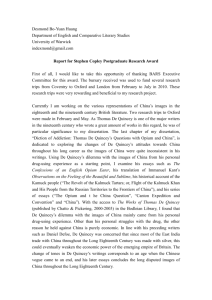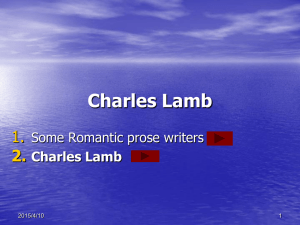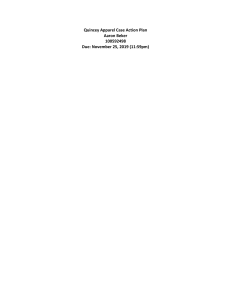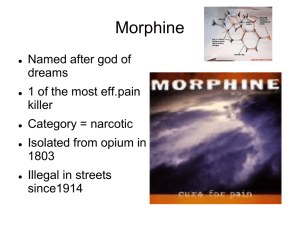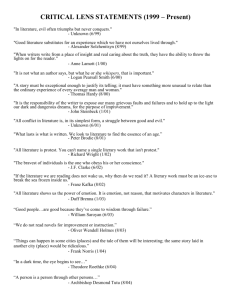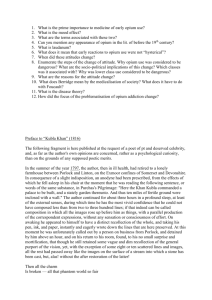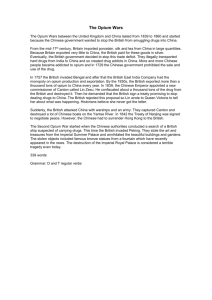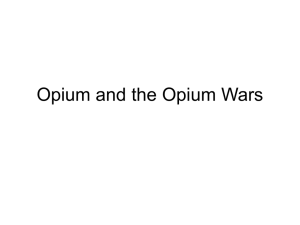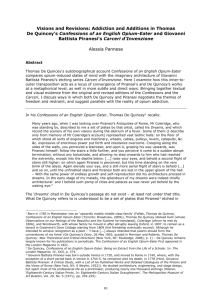The Confessions of an English Opium-eater
advertisement
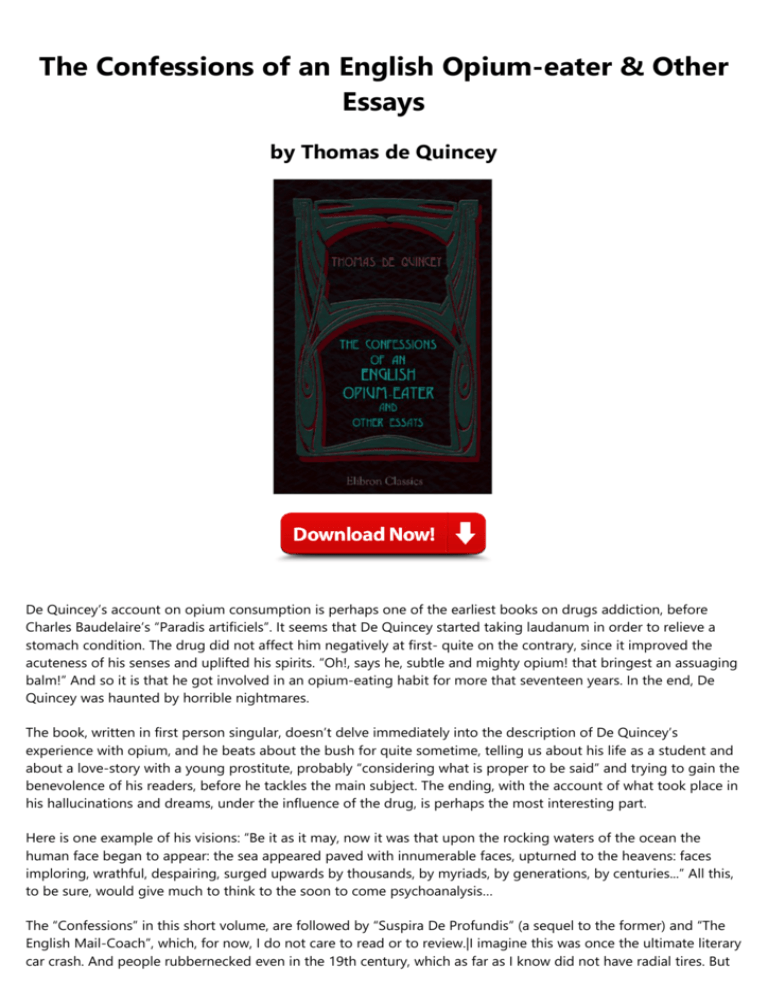
The Confessions of an English Opium-eater & Other Essays by Thomas de Quincey De Quincey’s account on opium consumption is perhaps one of the earliest books on drugs addiction, before Charles Baudelaire’s “Paradis artificiels”. It seems that De Quincey started taking laudanum in order to relieve a stomach condition. The drug did not affect him negatively at first- quite on the contrary, since it improved the acuteness of his senses and uplifted his spirits. “Oh!, says he, subtle and mighty opium! that bringest an assuaging balm!” And so it is that he got involved in an opium-eating habit for more that seventeen years. In the end, De Quincey was haunted by horrible nightmares. The book, written in first person singular, doesn’t delve immediately into the description of De Quincey’s experience with opium, and he beats about the bush for quite sometime, telling us about his life as a student and about a love-story with a young prostitute, probably “considering what is proper to be said” and trying to gain the benevolence of his readers, before he tackles the main subject. The ending, with the account of what took place in his hallucinations and dreams, under the influence of the drug, is perhaps the most interesting part. Here is one example of his visions: “Be it as it may, now it was that upon the rocking waters of the ocean the human face began to appear: the sea appeared paved with innumerable faces, upturned to the heavens: faces imploring, wrathful, despairing, surged upwards by thousands, by myriads, by generations, by centuries...” All this, to be sure, would give much to think to the soon to come psychoanalysis… The “Confessions” in this short volume, are followed by “Suspira De Profundis” (a sequel to the former) and “The English Mail-Coach”, which, for now, I do not care to read or to review.|I imagine this was once the ultimate literary car crash. And people rubbernecked even in the 19th century, which as far as I know did not have radial tires. But there have been so many truly gnarly drug slave narratives since the publication of this once "shocking" book (go English Mail-Coach”, which, for now, I do not care to read or to review.|I imagine this was once the ultimate literary car crash. And people rubbernecked even in the 19th century, which as far as I know did not have radial tires. But there have been so many truly gnarly drug slave narratives since the publication of this once "shocking" book (go Burroughs go!) that this one seems quite pallid and tepid by comparison now. Reading this one is scraping the bottom of the pharmacological lit barrel. You'll have much more fun with James Frey. De Quincey's great crimes as an addict were his neglect of loved ones and his feelings of powerlessness. He just became a sloth and hibernated into his drug world of cheap and easy visions. His crimes as a writer consisted of writing terribly purple prose like this book. Prose can't really get much more purple than this sentence: "I was kissed, with cancerous kisses, by crocodiles, and was laid, confounded with all unutterable abortions, amongst reeds and Nilotic mud." Tim Burton would probably want to film that. So there's that. But much of this is dull, pedestrian (even if purple) prose and uninspired visions that want to elevate themselves into the clouds. Yes, Coleridge (great lover of drug visions) encouraged the boy. It's no surprise that De Quincey's mind divagates constantly, and this even makes sense if the author wants to communicate to you how his mind wandered under the influence of opium. Most of it just made me think, however, of the French proverb about how the dreams of others are always boring. (It's not that I always agree with that proverb, but in this case I do.) A few of his weird trips did hold some interest for me, like his hallucinations of endless faces, with De Quincey lying there on a bed, unable to move, watching this manifestation, this ectoplasm, as though he were seeing every human being who ever existed--or would exist. De Quincey will talk about anything ad infinitum, ad nauseam. In other words, he was very much a 19th century blogger. I know: takes one to know one. Those 19th century collections of essays were, I think, basically proto-blogs. But even among bloggers there are vast differences. I was reading the essays of Charles Lamb the same week I read this, and I found those much more appealing. It's not that Lamb doesn't write his share of purple prose. It's just Lamb's purple prose has less bathetic, unintentional humor. There's much more wit than twit. And the latter can truly turn an interesting phrase to rival the poets of the period. Lamb is just a better 19th century blogger than De Quincey. De Quincey lacks that "inner blog censor." I can relate to the poor guy. He got an extra star for tortured kinship.|A strangely wonderful book, that is, at the same time wonderfully strange!!|Intolerably tough to read but a force worth going through. De Quincy was a xenophobe, drug addict, racist, imperialist, etc etc. But his writing is, hyperbole aside, incredible. He digresses, stops and starts tangents, and sometimes (actually often) ends stories with absolutely no resolution. Like post-modern even before modernism. Not easy but definitely great reading.|The first part of this autobiographical work takes the form of a lengthy discourse on the author’s childhood and teenage years. We learn about De Quincey’s family, his education, and his love of walking, literature and classical studies, all of which are described in excruciating detail. At the age of eighteen De Quincey moves to London, where he exists in a near destitute state, surviving on borrowed money. An illness results in a doctor prescribing the author laudanum, which contains opium. De Quincey starts using the drug regularly, culminating in addiction. The section of the book (approx. one third) dedicated to opium is divided into two parts - the pleasures of opium and the pains of opium. Later De Quincey, who infers that it was his early experiences that led to his use of the drug, attempts to reduce his opium intake. This reader would compare reading Confessions of an English Opium-Eater to struggling through sinking mud. For despite the fact that there are a mere 201 pages, some interesting historical insights, details of opium-fuelled dreams, in addition to an ornate, almost poetic prose style, no doubt the influence of Wordsworth of whom the author was an ardent devotee, toiling through the book was extremely arduous. This was due to the turgid blocks of text devoid of paragraphs, the unremitting references to classical studies and literature, the tedious footnotes, grandiloquent use of language (c.f. novitiate, tintinnabulous and antediluvian), and self-indulgence. This reader would strongly recommend that anyone enticed by the prospect of this, the forefather of addiction literature, read the original 1821 version, and not make his mistake of wading through the considerably expanded 1856 edition.
